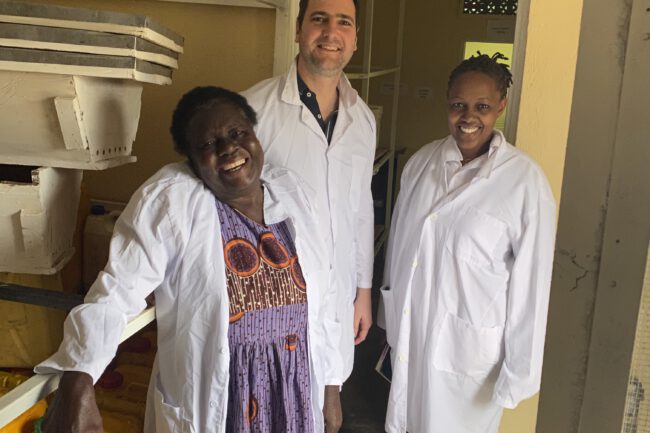Agriculture is the largest sector in Uganda, employing most of its population (roughly 65%) – especially labour market entrants – about 40% of youth aged 15-24 are engaged in agriculture, forestry, or fishing. Despite its size, the sector contributes about 23% to the total GDP of Uganda and 31% of export. The small-scale and informal nature of agricultural and agro-industrial enterprises is said to cause this gap between GDP and the employment contribution of agriculture. The government of Uganda has stressed the importance of the agro-industrial value chains for employment and economic value creation, promoting innovation and productive transformation that links different value chain actors.
Woord en Daad has set up the Trees x Bees initiative to create sustainable labour opportunities for young women in rural Uganda. With 1.2 million Ugandans being involved in the apiculture sector, beekeeping has a great potential for generating (additional) income in the country. The industry produces honey, propolis, beeswax, and bee venom that are marketed internally as well as exported to neighboring countries, such as Kenya, the Democratic Republic of Congo, and South Sudan.
Beekeeping is especially a promising sector for the Ugandan youth, as starting up a business in the sector typically requires low investment and yields beneficial returns on the costs it implies. With local means at their disposal, an entrant can set up their own hives and an apiary and (with some basic knowledge about bees) can start a self-sustaining beekeeping business. However, even though beekeeping does not require much capital investment to begin, some access to land, skills, and assets are essential for the new entrants to become commercially viable.

Photo by Woord en Daad
Access to specialised equipment and clean working environments are especially central to the business’s success. As new entrants to the apiculture value chain, youth, predominantly young women, may face constraints in accessing some of these requirements. Despite the sector having a great potential to create attractive economic prospects for young women in rural households – as they can combine beekeeping activities with care and other responsibilities – several systemic and cultural barriers make it challenging for women to enter beekeeping. First of all, young women are usually not landowners and need to negotiate with their families, landholders of the household, and governments to get access to land to establish an apiary. Then, the lack of other assets, such as beehives and essential equipment like protective gear, also poses a barrier to those who do not have start-up capital. In addition, knowledge about beekeeping, technical assistance, and skills development can become another significant roadblock impacting the performance of the starting beekeepers. Knowing the basics of apiary management, such as when to harvest and what to do when black ants creep into colonies, is essential to enjoy the sweet honey.
On top of the practical obstacles, the cultural implications of beekeeping make it yet more challenging for women to enter apiculture. Not everywhere is beekeeping is seen as an appropriate livelihood or as a money-making business. Traditionally, men were the ones hunting for honey and climbing in trees; and men of age were the ones to keep bees. Therefore, the image of a beekeeper is predominantly a male one – an older one.
The disadvantageous perceptions of beekeeping can be addressed by providing young male and female beekeepers with role models with a business-minded approach. This change can set preconditions for more decent work in agriculture for youth and women entering the job market. Trees x Bees has set out to stimulate Ugandan women’s engagement in apiculture and aims to have women make up 70% of the involved youth in the project. The project encourages beekeeping as a business (self-employment) for Ugandan youth, significantly focusing on women in rural areas. Youth and women engaged in this project will get all the support they need to kick start their beekeeping business. Since the major barriers for youth employment in an inclusive value chain are sustainable land use rights, knowledge and skills, equipment, and upfront investment, Trees x Bees will assist the entrants with all the necessary resources and expertise, allowing them to repay the (investment) support they receive from the apiculture development fund (ADF). The repayments to the ADF will be utilised to support the more generations of (female) youth to become beekeepers.
This article is based on INCLUDE’s publication on beekeeping in Uganda. Read more about Trees x Bees here.